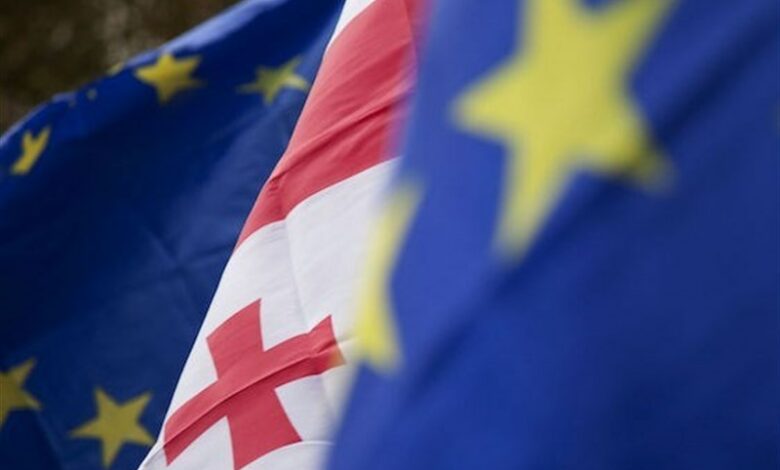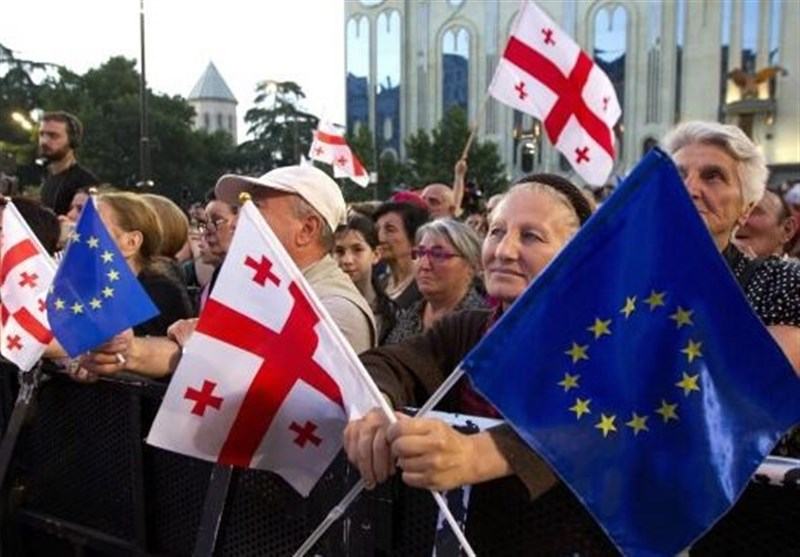Challenges of Georgia’s membership in the European Union

| Georgia faces the challenge of balancing its pursuit of EU membership with the risk of Russian adventurism, which requires a cautious approach to avoid possible consequences. |
According to the international group Tasnim News Agency, as Georgia approaches Membership in the European Union has cast a shadow over this South Caucasus republic. On December 15, the European Union fast-tracked Georgia’s application for EU membership and granted it candidate status, thus expressing its support for the countries of Eastern Europe and the Caucasus, which they say are facing the specter of Russian aggression. /p>
The challenges in Georgia’s potential membership in the European Union are not only facing external and ontological problems like Russia, but this country must also overcome a series of internal obstacles and problems.
Strive for European integration
Demand for integration with Europe is nothing new in Tbilisi. Since the dissolution of the former Soviet Union, anti-Russian sentiment has marked the contours of Georgian politics. From the late 90s to the early 2000s, the North Atlantic Treaty Organization (NATO) expanded rapidly, and Georgia actively sought membership in this organization.
Seeing the possibility of crossing the red line By Georgians, Russian forces were mobilized to South Ossetia and Abkhazia under the pretext of alleged genocide, and Moscow supported the claim of sovereignty of these two regions. Since then, political elites in Georgia have cautiously pursued their ambitions to converge with European structures.
Georgian exports to Russia increased by 32% in the same year. Despite the normalization of relations with Russia, the number of supporters of the European project increased year by year in proportion to the rise of anti-Russian sentiments.
In 2014, Georgians signed a cooperation agreement with the European Union signed Simultaneously, Georgia’s political elite focused on rebuilding its relations with Russia. In 2014, direct flights between the two countries resumed, including visa-free travel.
The high volume of bilateral trade helped reduce tensions with Russia. Georgia’s imports from Russia in 2023 increased by 79% to 1.8 billion dollars compared to 2022. Georgia’s exports to Russia increased by 32 percent in the same year.
Despite the normalization of relations with Russia, the number of supporters of the European project has increased year by year in this country in proportion to the increase in anti-Russian sentiments. he does. However, the political elites in Tbilisi do not have the feeling and opinion to destroy their relations with Russia, despite talking about the future of Euro-Atlantic and having the desire to join NATO, and therefore Ukraine because of the aspirations of Kiev regarding the membership in NATO. NATO is blamed for the Russia-Ukraine war.
Accepting the conditions set by the European Union and implementing them may be a challenge for the current ruling party of Georgia, because some political interests of the Georgian dream with The Georgian Euro-Atlantic aspirations of the people of this country are in conflict. /span>
Currently, the level of compliance of Tbilisi with the foreign and security policy of the European Union is 43%. In order to create a higher compliance rate, the European Union has set nine conditions for Georgia’s membership in the European Union, which include combating misinformation and foreign interference, aligning Georgia’s foreign policy with the European Union’s foreign policy, strengthening Georgia’s democratic institutions, and implementing the Commission’s recommendations. Venice and the “de-oligarchizing” parts of the Georgian economy are variable.
Despite the fact that 89 percent of Georgians want to join the European Union from 2022, Georgia’s political elite has been very slow in implementing reforms. have been. This shows a dichotomy between the aspirations of the people and the practical policy of the elites in this country.
However, Georgia has nothing to offer to the European Union in the economic field and considering that Georgia’s GDP is half of Bulgaria’s (the EU’s poorest member) and threatens to weaken the EU.
Worse, Tbilisi does not share a land border with any EU country. . Even in a normal scenario, joining the European project is a difficult task and this process takes an average of 9 years.
Another serious obstacle to Georgia’s membership in this union is relationship management. It is with Russia. The Georgian Dream Party and other political and economic structures of Tbilisi, if they want to be admitted to the European Union, must agree to the reforms considered by the European Union, including the reforms that separate Georgia from Russian influence.
Increasing engagement with Russia will be a concern for EU membership. In addition, connectivity will be difficult because Georgia does not have a border with an EU country.
Russian dependence
Separation from Moscow will be difficult, as Russia’s influence in Georgia is increasing. In 2022, more than 15,000 Russian companies were registered in Georgia, which is a 16-fold increase compared to 2021.
Regarding economic relations, Russian exports to Georgia have increased since the beginning of the war in Ukraine, and the share of Russian energy in Georgia’s energy portfolio has reached 51%. With the gross growth of oil imports amounting to $482 million, gas imports increased by 32% and coal imports increased by 157% to $70 million in the same year. Also, in the field of tourism and tourism, the number of visitors from Russia has increased by 20% since 2021.
This increase in interactions with Russia will raise concerns for membership in the European Union. In addition, communication will be difficult because Georgia does not have a common border with an EU country.
Sofia, the capital of Bulgaria, is the closest point of connection and crossing of the European Union to Georgia. which is located at a distance of 1500 km from the water borders of this country. Given its distance and, as already mentioned, with a GDP 50% lower than Bulgaria’s, Georgia has nothing to offer the EU economically. The war in Ukraine has made EU-Russia relations more tense, and Georgia’s trade with Moscow and Russia’s creeping influence in Georgia will be problematic for the EU.
Apart from Russia, creeping influence China in Georgia may be a problem for European structures. Georgia is a vital hub for China’s ambitious Belt and Road Initiative. Projects such as the Anakila deep sea port, the Middle Corridor, the Baku-Tbilisi-Kars railway and the free trade agreement signed between the two countries have established cooperation at the highest level. Such levels of engagement could be worrying for Brussels, given that the EU and several member states are realigning their relationship with Beijing.
Daily politics in Georgia
Georgian politicians are divided on the EU issue. Bidzina Ivanishvili, former Prime Minister of Georgia and founder of the Georgian Dream Party, is an oligarch who made a fortune under Russian President Boris Yeltsin and set Georgia on a path that did not move westward as rapidly as its predecessors. Also, like the presidents before him, he did not take the path of hostility towards Russia.
On the other hand, Salome Zurabishvili, the pro-Western and pro-EU president, does not have the unconditional support of the Dream Party and has been traveling to European capitals to discuss membership. Georgia was at risk of impeachment in the European Union due to actions against the Constitutional Court of this country.
As Georgia slowly moves towards Brussels, the Georgian Dream Party is confident of victory in this October’s elections.
Georgia faces the challenge of balancing its pursuit of EU membership and avoiding an all-out confrontation with Russia. This requires a cautious approach to avoid the possible consequences of the conflict in the northern regions of Georgia, i.e. Abkhazia and South Avesta. which is reflected from the European Union describes that in this union different countries are integrated at different levels and speeds depending on the political situation of each country. also to provoke, that is why the political elites of Georgia cautiously deal with the issue of annexation. As Georgia slowly moves towards Brussels, the Georgian Dream Party is confident of victory in this October’s elections. For the long term future of this country in the European Union, only time will determine many issues.
end of message/
| Publisher | Tasnim News |



